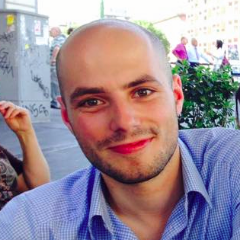Mahler’s Symphony no. 8 has not been heard in Milan since Riccardo Chailly’s performance 27 years ago with the Sinfonica Nazionale della RAI. Tonight, Chailly returned to perform the “Symphony of a Thousand” with his former band, the Orchestra Sinfonica di Milano Giuseppe Verdi in an event that formed the crowning jewel in the orchestra’s 20th anniversary celebrations. He was joined by strong line-up of soloists and the amassed forces of the Coro Sinfonico di Milano Giuseppe Verdi, the Coro di Voci Bianche de la Verdi, and Spain’s prestigious Orfeón Donostiarra.
Chailly is one of the most revered Mahler interpreters of his generation and his recent performances of the symphonies with the Leipzig Gewandhaus Orchestra were widely regarded as landmark interpretations. Nevertheless, I was not sure that this performance was going to move. Mahler 8 is constructed out of two texts that are in many ways incongruous – Part 1’s “Veni, creator spiritus” is a ninth-century Latin hymn, meditative in mood but turned on its head in a motet-like movement of extrovert grandiloquence, whilst Part 2 is an almost symphonic setting of Goethe’s romantic depiction of Faust’s ascent to heaven. The work is thus notoriously hard to piece together, and I wondered in the slightly prosaic surroundings of the tonight’s venue, the Milano Congressi (one of Europe’s largest conference centres), whether the performance would generate the electricity required to sustain its central but elusive theme of redemption through love.
I was wrong to doubt. Once the ears adjusted to the rather bland acoustics, of the hall this was an exhilarating, enriching performance that moved to the core.
The first movement was high-octane and Chailly adopted a brisk tempo miles away from the stately march on his famous recording with the Royal Concertgebouw Orchestra. Trumpets blazed iridescently, tenors and basses roared, and judicious pacing meant that the climax on the words “Gloria Patri Domino” was euphoric. But there were plenty of moments of shade, and in the “infirma nostri” the amassed choirs produced a haunting glow atop Luca Santaniello’s lonely, meandering violin solo. An intricate section from the soloists concluded with a heart-wrenching singing on the words “lumen lumen” from tenor Brenden Gunnell, and the delicately rising passage that followed displayed La Verdi’s trademark lustrous violin sound.
This was the story throughout: the incandescent light was always interspersed with moments of introspection, but the intensity never dwindled. A continuous seam of energy ran through the heart of this, performance and in Part 2’s craggy, wooded world, the haunting textures and tragic climaxes were a single, mesmerising journey that did not let go. Chailly was an imposing sight, always strongly rooted, and rather than drawing the sounds out of the musicians in front of him it seemed to emanate from his being.
The dark forest gives way to Goethe’s sublime ether, and here the choirs soared. Orfeón Donostiarra’s “Angels” bore Faust’s soul with a light, excitable fervour whilst the “Younger Angels” of Erina Gambarini's chorus were rounded and triumphant in the fanatical “Jauchzet aug!&rquo; – the “Blessed Boys” of the Coro di Voci Bianche stood between the two and fizzed through the busy texture with ease. A strong series of solos followed from the “Penitent Women”. Mezzo Anneli Peebo’s “Maria Aegyptiaca” revealed a voice of great depth, and soprano Manuela Uhl’s “Una Poenitentium” was irresistibly tender when reunited with Faust. The penitents’ trio of soprano Ricarda Merbeth and mezzos Lioba Braun and Peebo featured singing that was well coordinated and sensitively phrased.
The soloists were exemplary throughout and they produced a vast array of colours that helped give the performance overall shape. Bass Samuel Youn’s “Pater Profundus” was dark and tragic and baritone Markus Werba’s “Pater Ecstaticus” was warm and solemn. Gunnell’s aria “Hier ist die Aussicht frei” was rapturous, and Valentina Farcas’ two lines as “Mater Gloriosa” were one of the best moments of the evening, her words floating overhead a she sang from an elevated position behind the choir.
The finale was an incredibly beautiful moment, and this was largely a result of the conductor’s erudite pacing. The rolling lust on the words “Blicket auf” dissolved into a thin gauze of arpeggiating celesta and upper woodwind that made time stand still. Chailly drew out an exquisite suspension from the first flute, weighted to make the heart stop, and the choirs emerged in a glowing, featureless expanse on the words “Alles Vergängliche”. The embers were stoked with Merbeth and Uhl’s stratospheric, sinuous lines which were pianissimo yet supported and the fire blazed when the tenors and basses echoed with vigour. This built up to an exhilarating climax and the final “Alles Vergängliche”, full choir now supported by organ, was a wall of sound.
In Chailly’s hands, Mahler’s 8th was lean and expressive. Each phrase was lovingly sculpted but was also part of a larger, coherent whole. Skilful conducting combined with a passionate commitment from the musicians across the board allowed Mahler's optimistic message to speak with intensity.


